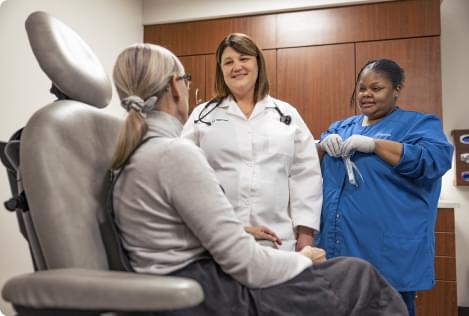Getting Questions Answered - Meeting with Your Baby's Doctor
It is important to us that you know how your baby is doing and have time to ask questions.
The doctors and nurses in the unit do their best to keep you informed, but you are welcome to ask the nurses questions and set up times to meet with your baby's doctor.
To make it easier for you to have time to talk with the doctor, there is an appointment book at the desk as you enter the RNICU. Ask the unit secretary for the book and choose an available time slot that fits your schedule. Let your baby's nurse know the time to help coordinate your appointment.
The doctor will come to your baby's bedside or move to one of the conference rooms to meet with you.
Please remember that if there is an emergency, the doctor may need to cancel your time. If you need to cancel your appointment, please let us know. This will allow additional appointment times for other families.
Who is Caring for Your Baby?
During your baby's stay in the NICU, you will meet many different healthcare professionals on the team caring for your baby. Here are the services they provide:
Assistant Department Manager (ADM)
A registered nurse who assists the Department Manager.
Case Manager
A registered nurse available to assist with insurance verification/authorization. Helps coordinate discharge planning.
Chaplain
A religious person dedicated to spiritually supporting patients and families in difficult situations; available 24 hours a day.
Department Manager
A registered nurse with extensive neonatal experience who has 24-hour responsibility and accountability for the administrative, clinical and human resource management and professional development of the staff in the patient care area.
Fellow
A fully trained pediatrician who is in the process of completing specialty training in neonatology.
Lactation Consultant
A nurse with specialized training in lactation and breast feeding techniques; a helpful resource for a mother wishing to breast feed or having difficulty with breast feeding.
Neonatal Nurse
A specially trained registered nurse who provides comprehensive nursing care to critically ill newborns.
Neonatal Nurse Practitioner (NNP)
A registered nurse with specialized training and experience in neonatal medicine who manages the medical care of babies in the NICU.
Neonatal Physician Assistant (PA)
A nationally certified PA with specialized training in neonatal medicine who manages the medical care of babies in the NICU.
Neonatologist or Attending Physician
A pediatrician with special training and skills in the care of premature and sick newborn babies. All UM Health-Sparrow's neonatologists are board certified in pediatrics and neonatal perinatal medicine.
Pediatric Nutritionist
A nutritionist specially trained in the nutritional requirements of infants.
Pediatric Pharmacist
A pharmacist with special training in medications given to infants.
Pediatric Subspecialists
These include: pulmonologist (lung diseases), cardiologist (heart diseases), surgeon, geneticist (congenital or hereditary problems), radiologist, hematologist (blood diseases), physical therapist and occupational therapist (muscle tone problems, etc.).
Phlebotomist
A specially trained laboratory technician who obtains blood specimens from infants.
Resident
A doctor who is in the process of completing training in pediatrics or other specialty.
Respiratory Therapist
A therapist who manages the ventilators and other breathing machines that are crucial for a baby with respiratory problems.
Social Worker
A trained professional who helps parents handle the emotional and practical problems of birth and hospitalization, answering questions and providing resources for additional information.
Your Baby's Nutrition & Feeding
Nutrition and feeding are a very important part of your baby's stay in RNICU. Nutritional needs may be met in a number of ways, including:
- Intravenous fluids
- Total Parenteral Nutrition/Intralipid (TPN/IL)
- Breastfeeding
- bottle or formula feeding, or any combination of these.
Infants who are not feeding will receive TPN (total parenteral nutrition) that contains proteins, carbohydrates, fats, vitamins, and minerals important for your baby's growth. Feeding is introduced gradually as a baby's medical condition and gestational age allow.
Premature babies less than 33-34 weeks gestational age are often unable to coordinate sucking, swallowing, and breathing and may be fed by gavage (tube feeding).
Breast Milk
Breast milk is the best milk for your baby. Human milk is not only important for nutrition, it adds antibodies and defense cells that help prevent and fight infection. It also provides psychological benefits for you and your baby.
When breast milk is not available for medical reasons or by personal choice, there are multiple formulas made to imitate breast milk and to provide extra supplements depending on your baby's needs. Your baby's doctor will advise you as to the kind of formula or supplement is best for your baby's needs.
Formula Feeding
Formula can be used to meet your baby's nutritional needs. Special formulas are available to meet specific nutritional requirements, including formulas to meet the growth needs of premature infants. Your baby's doctor will select the formula that's best for your baby.
Breastfeeding
Pumping
Most premature or sick infants are not strong or mature enough to nurse at breast until they have had time to become healthy or to grow and develop. During this time, you can collect breast milk that can be stored and fed to your baby, and prepare for breast feeding, by using a breast pump which stimulates your breasts to produce milk. It will take about 3-5 days after delivery for your milk to come in, but pumping should be started as soon as possible after delivery (preferably within the first 8 hours) to establish and maintain an adequate milk supply.
Electric breast pumps are available in NICU to use while your baby is in the unit. A breast pump kit can be obtained from your baby's nurse. Your baby's nurse can also help you with breast feeding tips and information, and a lactation consultant is available by appointment. Depending upon your insurance carrier, and with a prescription from your baby's doctor, you may be able to obtain an electric breast pump for home use.
Breast Milk Storage
It is important to wash your hands well before pumping milk for storage to prevent contamination. After pumping, breast milk should be poured directly into a sterile container, such as plastic baby bottle liners, and secured and refrigerated as soon as possible. Breast milk that you have collected can be stored in the NICU refrigerators for up to 48 hours. Breast milk can also be frozen and stored in the NICU freezer. Frozen breast milk may be stored for 3-6 months. Frozen breast milk, once thawed, must be used within 24 hours or discarded. It cannot be refrozen. All stored breast milk must be clearly labeled with baby's name, date and time of pumping.



